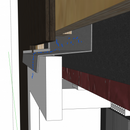Exterior foam insulation and window buck question:
Hi everyone! Some techincal questions for you. Some of my details might need a bit more cleaning up, I’m aware of that, curently trying to solve the following:
Some of the parts of my window assembly, you’re looking at a plywood box buck extending from structure to exterior face of foam, it is liquid flashed from interior all the way around the box to the outside face back to the building against the wrb, drainage matt infront to provide capillary break for exterior foam. I’ll provide a photo of that in photo 3. There’s quite a bit more details behind the assembly that you can’t see but that detail provided should be good enough for my questions below..
1.) Do you think insulating against the window as shown here is worth it? Here’s the video example https://www.youtube.com/watch?v=9vVxATjJ_wc
Can anyone give advice on if that insulation is really worth it? Hammer and hand says 15% savings overall heating demand in a year, that’s pretty good to me for designing performance homes as I do.
2.) Photo 1:
I’d also like to know about exterior insulation sealing. I am leaving the top and bottom horizontal foam to buck joints untaped, in the event that water needs to get out, but would it be better in this case to use highly permeable tape to cover that joint in the red circle in the photo and the top of window as well, cover those up with vapour open peel and stick joint tape?
3.) Photo 2:
I have seen a number of times and including one of joe lstibureks articles that the head flashing on the window doesn’t need to extend to the face of the foam like I have it or behind the foam to the wrb if that’s where the wrb is (on the sheathing plane), he says for example installing the flashing against the rainscreen is good enough, I don’t agree at all as that’s where water would migrate and rest ontop of the window jamb extension at teh head, in my phoot I atleast tape it to the foam and now if water drips behind the cladding at top of window, it’s directed out instead of pooling on the top of jamb extension at head… What do you guys think about that and I wonder why he recommends it’s not necessarry to make flashing atleast go back and cover the top of jamb extension head like I have it in my photo.
GBA Detail Library
A collection of one thousand construction details organized by climate and house part












Replies
ArayaHomes,
1. Surely that's just a 15% improvement in the R-value of the frame? Unless the frame performs incredibly poorly, any savings will be dwarfed by the losses through the glass.
2. I think leaving them open as you are suggesting is a good idea.
3. Joe can do whatever he is comfortable with. I'd sleep better with the flashing placed as you show it. The only places it makes sense to only run the flashing back to the rain-screen are at horizontal joints between differing cladding where it keeps the cavity clear from top to bottom. At any penetrations (doors, windows, vents, etc.) it should go back to the WRB.
Malcolm,
Thanks a lot for your reply!! I think I'm on the same page with you except for a bit of question 3.
I think that the flashing does not need to go back to the wrb under the wrb when the window frame and wrb are all flashed and integrated. To be clear, my exterior insulation is not my wrb, the wrb is behind the 2 layers of insulation against the sheathing and there is a drainage 1/8" gap adhered to the wrb between exterior foam. Hammer and hand best practice manual suggests in the case where there are two layers exterior insulation, to put flashing behind atleast one layer and not back to wrb to avoid thermal bridging, which I thought was a good idea. In this case, taping the metal flashing with quality tape to the foam exterior insulation was good enough in my opinion based on my assembly. I don't see the need to bring it back to the wrb if my rough opening is integrated into my wrb already, the head flashing at that point is simply to get rid of water that gets behind cladding, hence joe lstiburkes reason to not even bother taping head flashing to foam and instead just to the rainscreen, again as you know I don't like that and what's the point when you can just go back behind one layer atleast or tape to outtermost exterior insul layer.... Wondering your final thoughts on this?
Agreed. With your assembly that makes good sense.
Thanks so much! Awesome to get another perspective.